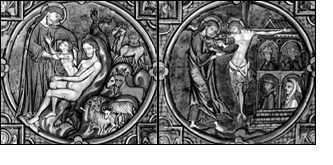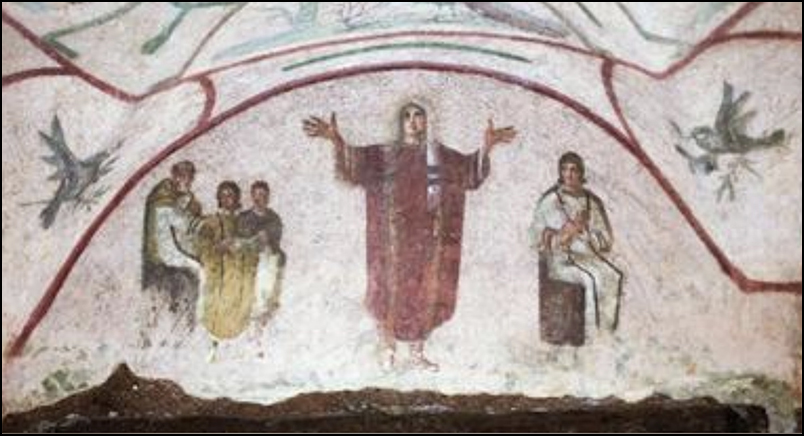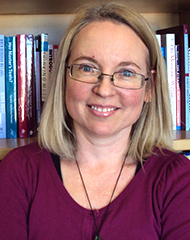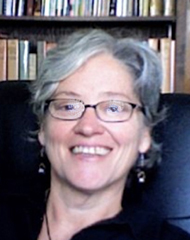 |
|
| |
| Class Prep |
|
|
| |
The Ecstatic Female Prophets in Corinth & the Compliant Wives of Paul's Interpreters
 - Paul famously advised the (celibate?) Corinthian women prophets to wear prophylactic veils, arguing that they should do this for fear of the angels (?) and because they were the image not of God but of man, since Eve had been created from man. Close analysis of the passage indicates that, while Paul is trying to make these women conform to a gender hierarchy, he nevertheless acknowledges a striking degree of equality and status for the women in this community. After all, he will tell them to veil when they lead prayer and prophesy; he will not tell them to stop praying and prophesying. What happens if we apply Judith Butler’s queer approach in her book Gender Trouble to Paul’s argument (Townsley)? Or imagine early Christian social relations from a trans perspective (Hornsby)?
-
- We will also be reading a later text that says it is by Paul, but that tells women that they should be married and that they should be silent in the Christian assembly. What happened to the celibate, leading women of Corinth? Why is a stronger form patriarchy in the assembly being reasserted? What happened to the baptismal formula, "In Christ...there is no longer male and female"? Elisabeth Schüssler Fiorenza, one of the pioneers of both second- and third-wave feminist biblical scholarship, will guide us in a study of how Christianity amplified the patriarchal regulation of women, and what can be done about that.
-
-
- Assigned Readings
-
- Primary:
- Secondary:
- Gillian Townsley, "Gender Trouble in Corinth: Que(e)rying Constructs of Gender in 1 Corinthians 11:2-16," The Bible and Critical Theory 2:2 (2006) 17.1-17.14 (Camino)
- Teresa J. Hornsby and Deryn Guest, Transgender, Intersex, and Biblical Interpretation, 81-93 (course textbook)
- Elisabeth Schüssler-Fiorenza, "The Justice of Wisdom-Sophia: Love Endures Everything—Or Does It?" in Sharing Her Word: Feminist Biblical Interpretation in Context (Boston: Beacon, 1998) 137-59 + notes
- online class prep
- Writing Focus:
- Connecting the parts (They Say/I Say 101-114)
-
- Seminar Leadership Summary and Questions
-
- Slides for Lecture
-
-
- Today's Authors
-
| |
 |
Gillian Townsley is the Chaplain and Religious Education teacher as St. Hilda's Collegiate School, an elementary through secondary school in Dunedin that is part of the Anglican Schools of Aotearoa New Zealand and Polynesia. She is also a University Teaching Fellow at the University of Otago. She is author of The Straight Mind in Corinth: Queer Readings across 1 Corinthians 11:2-16 (SBL Press, 2017). |
| |
 |
Teresa J. Hornsby is a Professor of Religion at Drury University and an Affiliated Professor of Religious Studies at Chicago Theological Seminary. Along with her book co-authored with Deryn Guest, she is a co-editor (with Ken Stone) of Bible Trouble: Queer Reading at the Boundaries of Biblical Scholarship, and author of Sex Texts from the Bible, as well as numerous essays, chapters, and encyclopedia entries. |
| |
 |
Elisabeth Schüssler Fiorenza is Krister Stendahl Professor of Divinity at Harvard Divinity School. A New Testament scholar, she has written numerous books, including the ground-breaking In Memory of Her: A Feminist Theological Reconstruction of Christian Origins (Crossroad, 1985), and edited the two-volume feminist introduction and commentary on the Bible, Searching the Scriptures (Crossroad, 1997). Co-founder and co-editor of the flagship Journal of Feminist Studies in Religion, she also served as the first woman president of the Society of Biblical Literature, and has received eight honorary doctorates in the U.S. and Europe. |
-
-
- Further Reading
-
- 1 Corinthians
-
- Hamori, Esther. Women's Divination in Biblical Literature: Prophecy, Necromancy, and Other Arts of Knowledge. New Haven, Connecticut: Yale University Press, 2015.
-
- Knust, Jennifer. Abandoned to Lust: Sexual Slander and Ancient Christianity. New York: Columbia University Press, 2006.
-
- MacDonald, Dennis R. There Is No Male and
Female: The Fate of a Dominical Saying in Paul and Gnosticism. Philadelphia:
Fortress, 1987.
-
- MacDonald, Margaret Y. Early Christian Women and Pagan Opinion:
The Power of the Hysterical Woman. Cambridge: Cambridge University
Press, 1996.
-
- Marchal, Joseph. "The Corinthian Women Prophets and Trans Activism: Rethinking Canonical Gender Claims." In Bible Trouble: Queer Reading at the Boundaries of Biblical Scholarship (ed. Teresa J. Hornsby and Ken Stone; Atlanta: Society of Biblical Literature, 2011) 223-46.
-
- --------. "Female Masculinity in Corinth?: Bodily Citations and the Drag of History." Neotestamentica 48:1 (2014) 93-113.
-
- Martin, Dale B. The Corinthian Body. New Haven, Connecticut: Yale University Press, 1999.
-
- Matthews, Shelly. "A Feminist Analysis of the Veiling Passage (1 Corinthians 11:2-16): Who Really Cares that Paul Was Not a Gender Egalitarian After All?" Lectio Difficilior 2015:2 (2015).
-
- Stökl, Jonathan and Corrine L. Carvalho, eds. Prophets Male and Female: Gender and Prophecy in the Hebrew Bible, the Eastern Mediterranean, and the Ancient Near East, SBL Ancient Israel and Its Literature 15. Atlanta: Society of Biblical Literature, 2013.
-
- Townsley, Gillian. The Straight Mind in Corinth: Queer Readings across 1 Corinthians 11:2-16, Semeia Studies 88. Atlanta: SBL Press, 2017.
-
- Wire, Antoinette Clark. The Corinthian Women Prophets: A Reconstruction through Paul's Rhetoric. Minneapolis: Fortress, 1990.
-
- 1 Corinthians 14; 1 Timothy 2
-
- Balch, David L. "Household Codes." In Greco-Roman
Literature and the New Testament: Selected Forms and Genres (ed. David E.
Aune; Atlanta: Scholars Press, 1988) 25-50.
-
- Hylen, Susan E. "Women διάκονοι and Gendered Norms of Leadership." Journal of Biblical Literature 138:3 (2019) 687-702.
-
- MacDonald, Margaret Y. The Pauline Churches: A Socio-historical
Study of Institutionalization in the Pauline and Deutero-Pauline Writings. Cambridge:
Cambridge University Press, 1988.
-
- Madigan, Kevin and Carolyn
Osiek, eds. Ordained Women in the Early Church: A Documentary History. Baltimore,
Maryland: Johns Hopkins University Press, 2005.
-
- Niccum, Curt. "The Voice of the Manuscripts on the Silence of Women: The External Evidence for 1 Cor 14:34-35." New Testament Studies 43:2 (1997) 242-55.
-
- Payne, Philip B. "1 Timothy 2.12 and the Use of Oude to Combine Two Elements to Express a Single Idea." New Testament Studies 54:2 (2008) 235-53.
-
- --------. "Fuldensis, Sigla For Variants in Vaticanus, and 1 Cor 14.34-5." New Testament Studies 41:2 (1995) 240-62.
-
- --------. "Ms 88 as Evidence for a Text without 1 Cor 14:34-35." New Testament Studies 44:1 (1998) 152-8.
-
- Thurston, B. Bowman. The Widows: A Women's Ministry in the Early Church. Minneapolis:
Fortress, 1989.
-
-
- Acknowledgements
-
|
|
| |
|
|
| | | |
